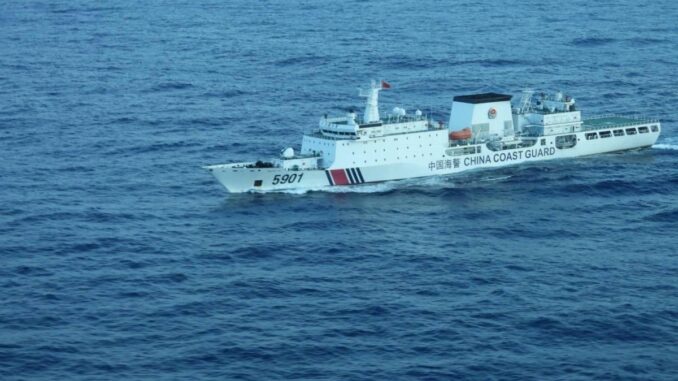
THE National Maritime Council (NMC) on Monday condemned the continued illegal presence of Chinese ships within the Philippines’ exclusive economic zone (EEZ).
In a statement, the NMC said the two vessels of the China Coast Guard (CCG) — identified as CCG 5901 and CCG 3304 — have been operating unlawfully in the waters around Bajo de Masinloc (Scarborough Shoal) 70 to 90 nautical miles off the coastline of Zambales on Jan. 5 and 10, respectively.
It also called out Beijing’s deployment of a People’s Liberation Army-Navy (PLA-N) helicopter, “which hovered above a PCG (Philippine Coast Guard) vessel that was lawfully conducting its mandate in a peaceful, non-provocative, and professional manner.”
“These actions are clear violations of the Philippine Maritime Zones Act (Republic Act 12064) and international law, particularly the 1982 United Nations Convention on the Law of the Sea (Unclos) and the 2016 Arbitral Ruling that affirmed the Philippines’ sovereign rights in its maritime zones, especially in the West Philippine Sea (WPS),” the NMC said.
These “escalatory actions,” it further stated, are inconsistent with the exercise of freedom of navigation and innocent passage as well as the exercise of rights and observance of duties by other States in the Philippines’ EEZ under the Philippine Maritime Zones Act and the 1982 Unclos and the 2016 Arbitral Ruling.
These incidents prompted the Philippine government to file another diplomatic protest against China, asserting that the Philippines has long-standing sovereignty over Bajo de Masinloc and its territorial sea as well as “over waters within the Philippines’ EEZ measured from its lawful archipelagic baselines.”
“These maritime zones, as declared in the Philippine Maritime Zones Act, are in accordance with the 1982 Unclos and the 2016 Arbitral Ruling. China does not have any basis to conduct law enforcement activities or maritime patrols over these waters,” the NMC said.
“The Philippines remains resolute in asserting and protecting its sovereignty, sovereign rights and jurisdiction in the WPS, and urges China to observe Philippine laws and comply with its obligations under international law, particularly Unclos. China should direct its vessels to desist from conducting illegal actions that violate the Philippines’ sovereign rights in its EEZ,” it added.
This was not the first time the government denounced the encroachment of Chinese vessels in Bajo de Masinloc.
A few days after ringing in the new year, the National Security Council (NSC) tagged as an act of “intimidation, coercion, and aggression” the CCG’s “Monster Ship” patrol operations in the Philippines’ EEZ.
Sen. Risa Hontiveros, meanwhile, reiterated her appeal to Malacañang to file new cases against China before an international court amid reports that China’s “Monster” navy ship is back in Zambales.
The senator said China is not starting the year right. “Instead of keeping the peace in the region, she has chosen to create more disturbance,” she said.
“Beijing’s ships will only keep coming back if we do not take appropriate measures,” Hontiveros said in a statement on Monday.
“In the meantime, we must work on strengthening alliances with like-minded nations whose coast guards can patrol with ours,” she said.
Hontiveros added, “Together, let us show China that no ‘Monster’ ship can scare us.”
Senate President Pro Tempore Jinggoy Estrada said the repeated incursions of China Coast Guard vessels into Philippine waters, particularly within the country’s exclusive economic zone (EEZ), “require a comprehensive and proactive response from our government.”
“I think it’s crucial to take action now. We need a proactive, united, and sustained approach to protect our rights and ensure the safety and security of our people,” he said.
“The Philippines will not yield to coercion or intimidation when faced with challenges to our sovereignty,” Estrada said in a statement.
He said the 2016 Arbitral Award by the Permanent Court of Arbitration (PCA) in The Hague, Netherlands, “affirmed our claim to sovereign rights in the maritime areas of the West Philippine Sea.”





Be the first to comment